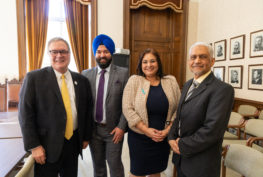OLYMPIA — As federal aid for crime victim services continues to drop, a new proposal would ensure Washington state has a sustainable process to fill the gap, so crime victims and survivors receive the support they need.
The Victims of Crimes Act funds critical services, such as crisis counseling, legal aid, and emergency financial assistance, for victims of any type of harm. The Victims of Crime Act State Plan is Washington’s most significant resource for crime victims — assisting about 52,000 people each year.
Since 2018, federal funds for these services have steadily declined to the lowest point in a decade. The funding the state receives fluctuates because the fund is not made up of taxes, but rather federal criminal fines, forfeitures and fees.
The Legislature has provided supplemental funds over the past four years, but that funding is set to expire June 30, 2025. State plan funding is projected to be cut in half July 1, 2025.
Senate Bill 5362, sponsored by Sen. Manka Dhingra (D-Redmond), would initiate funding at $50 million per biennium, with a planned gradual increase to $70 million over time to keep pace with growing demands.
“This is about making sure we get resources to survivors,” Dhingra said. “I’m heartbroken to hear about the number of domestic violence agencies that have had to shut their doors because of a lack of resources. This will provide a more sustainable mechanism for those critically important services.”
In the past two years, Office of Crime Victims Advocacy received 364 applications asking for $87 million in funding. Because of limited funds, it could only support 37% of the applications.
“Survivors of crime are twice victimized — first by the crime itself and then by the legal system. Two decades ago, it was enshrined into state law that the rights of crime victims shall be protected in a manner no less vigorous than the protection afforded to criminal defendants. We must uphold this promise,” said Rep. Lauren Davis (D-Shoreline), prime sponsor of the House bill. “When I was terrified after fleeing an abusive relationship, my lifeline was a DV agency. It would be unconscionable to force survivors to navigate this alone.”
The bill is modeled after similar legislation that passed in Maryland in 2023. It has support from a range of stakeholders:
Judy Chen, executive director of the Washington State Coalition Against Domestic Violence: “It’s terrible when an adult or child finds the courage to disclose abuse, only to face long waiting lists or the possibility of closed doors. Domestic violence shelters and programs have been struggling to stay open because of declining funding.”
Karen Sharp, chief operating officer of the King County Sexual Assault Resource Center: “Immediate response to survivors and their families is vital to long-term recovery. The chronic VOCA shortfall has turned into crisis; vital services may no longer be available to every sexual assault survivor statewide. That will have a profound impact on victims’ ability to recover.”
Leah Griffin, government affairs director of the Washington State Association for Justice: “I’m proud of the work I’ve done with Sen. Dhingra and the Washington State Association for Justice to eliminate the statute of limitations for claims of childhood sexual abuse, but as we eliminate obstacles for victims to come forward, we must also provide them with the support they deserve.”
Paula Reed, executive director of Children’s Advocacy Centers of Washington: “Like other victim services programs, Child Advocacy Centers (CACs) are at a critical juncture. The ability to serve child victims of abuse is in jeopardy as CACs grapple with severe funding challenges amidst surging community needs and rising costs. The long-term detrimental impacts of abuse are huge; the financial cost of child abuse is enormous. The more services we can provide, and the more early, effective interventions we can implement, the lower the cost is on the back end, in terms of mental health services, health services, incarceration, lost wages, lost productivity, early death — that is what child sexual abuse has been linked to.”
Riddhi Mukhopadhyay, director of the Sexual Violence Law Center: “With the significant increase in domestic and sexual violence cases since the pandemic yet less and less funding, advocacy groups and legal aid are struggling to provide crucial, often lifesaving, services to victims. It is unsustainable. SB 5362 is a common-sense bill that is addressing a critical funding gap and is an investment in public safety and our communities.”
###





